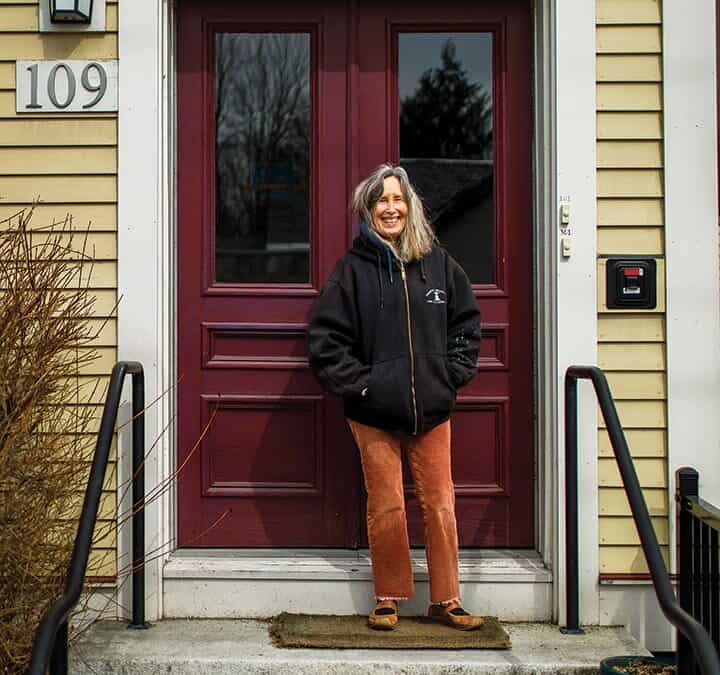I moved to 109 Green Street in Brattleboro (a Windham & Windsor Housing Trust building) about seven years ago. I always liked that part of town – the neighborhood feel, the historic architecture, the constant flow of activity to and from the nearby school and park. I am a retired nurse, and a grandmother, and I love creating connections with people and living in the chaos of everyday life. I keep up with the comings and goings of neighbors through regular walks and from a seat on my front porch. I see a lot from my porch, and I always have the choice to engage or just watch. I’m the kind of person who seeks connection — I just assume that people I meet are interesting. I see people come by with their dogs, and then people come by that are pregnant, then they come by with their babies, and then pretty soon the baby knows my name and I know their name. That has happened.
Soon after moving here, I had an idea. Was it possible my experience as a grandmother could contribute to my relationships with my neighbors? Couldn’t an entire community benefit from the nurturing support of a grandparent?
The idea behind the neighborhood grandmother is that the women – and men – who are generally at home, and have time, and have eyes, are important in a community. It’s an element that I appreciate myself in this community – that there are people available just for support.
Over time, I’ve connected with other seniors who live nearby, and it has been a wonderful benefit. By just taking a little walk every day, I can make friends and plans for other days, and I can hear what people want to talk about. And that has led me to be specifically available for some of my neighbors – little ways of helping, like rides to medical appointments, or getting rolls of quarters for the laundry. It’s not social work, it’s more like becoming an informal member of a care team. It gives a lot of meaning to my life.
A neighborhood grandmother is neither a program nor a job description. It’s a perspective – an approach to supportive housing that is non-threatening, uniquely steadying. We can be a stabilizing force in an area of transition. Just by walking around and meeting our neighbors, we can cut across class lines.
We do all have some insecurities, or need help managing everyday life sometimes. So this also becomes a way for older people to stay engaged, and accept help from others. During the pandemic, I personally appreciated the availability of the soup kitchens and Brattleboro Eats program, and often I would pick up meals for myself, as well as for my neighbors and friends and deliver them.
As a nurse in Kansas City, I worked with high-risk infants, many who came into the world amidst a backdrop of generational poverty. That’s where I saw the grandmothers. They were invisible at first. We would meet the mother and baby, and see what they needed, what their support was. I found over and over, while on paper someone’s situation looked pretty bad, there was a grandmother behind the scenes. And that grandmother was going to make sure that baby had what they needed. The grandmother-figure wasn’t always family. Sometimes they were church members. But their role, and their influence was powerful and clear.
So, my way of participating, of addressing inequities and building my community, is by becoming more like the grandmothers that I admired. Starting with where I live, having lives revealed to me has deepened my understanding of my own life, and opened up possibilities. I’ve come to realize when you work together, good things can happen.
# # #
Ellen Snyder is a resident of Brattleboro and serves on the board of Windham & Windsor Housing Trust.
A version of this piece originally appeared in the Windham & Windsor Housing Trust’s 2021 Annual Report.


